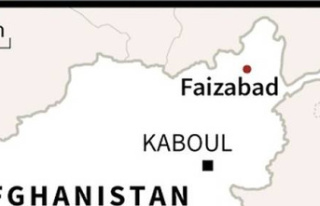With a title stolen from Barjavel (Ravage), and with an epigraph of a self-quotation from the author (under his alias, Roy Braverman), the first book in Paulsen's new collection, "The Big Dipper", is not exactly placed under the sign of humility... Nevertheless, Ian Manook, to whom we owe the series of Mongolian thrillers Yeruldelgger, opens this collection of adventure novels, "in the heart of the wild world", in a way could not be more ferocious.
In the Canadian Far North, at the beginning of the 1930s, four gendarmes knocked on the door of the cabin of a trapper, kind of Davy Crockett named Jones, who, for all answer and politeness, threw a volley of pellets at them. The manhunt begins. For weeks at minus 40 degrees Celsius, it's crazy, a disproportionate hunt (8 crews, 60 dogs, almost as many men, and even a plane...), an exclusively white universe. We are on the side of the forces of order, of the pack, bordering on irrationality, the truffle on the trail of a prey, solitary, on snowshoes, an invisible man of whom we know and will know nothing. Until the hallali. Since the story is true, it can be said, there will be blood on the snow.
Ravage, by Ian Manook (Paulsen, "La Grande Ourse", 342 p., €19.90).
The killer extract: Friday, January 1, 1932 The dogs understand the drama that is playing out. Urgency too. Despite the night and the cold, they redouble their efforts. The temperature fell below fifty degrees. The blizzard blows endless gusts loaded with dust. Abrasive crystals like glass dust. The sleigh spins through the white night of this never-ending storm. He has full confidence in his lead dog. The animal can read snow and finds its way blindly in deep powder and icy night, but the musher stays alert. The track is gone and the sled can overturn at any time. Gourmet in his warmest clothes, a booted foot on each runner, he counterbalances the power of the seven dogs to keep the toboggan on the right trajectory. Here he could count on no help. Not a living soul for dozens of kilometers around. The other sled followed the course of the frozen rivers. He must be several hours away from the race now. He chose to cut through the land and is not entitled to any error. Billy's life depends on it. A constant attention, at full speed, blinded by the snow-laden gusts. His efforts are so violent that he sweats despite the cold. Under his hood, his sweat freezes through the wool. A neck brace of ice formed around the collar of his garment. So thick that she squeezes him in and blocks his head. He must turn his entire bust to watch the forest on each side of the sled. Her breath frosts her split lips. Her eyelashes and eyebrows are spangled with icicles. He imagines himself helmeted in ice, launched at full speed through the forest by the gallop of dogs, the ghost of a Teutonic knight charging, alone, in the storm. This image makes him smile and gives him courage. A second of distraction which is immediately fatal to him. The lead dog skirts a clump of alder shoots. The two leading dogs, just behind, give all their power to initiate the turn. Taken aback, the man does not have time to compensate for the trajectory. The sled skids on a sloping patch of ice and hits the young trees head-on. The shock throws the man against the handlebar which takes his breath away. An irresistible force pulls him out and ejects him from his slide, a disjointed puppet in the night. In a mute cry, he swallows a breath of icy air which suffocates him and abrades his lungs. He falls like a rag, ass over head, in the middle of the lines and harnesses of dogs panicking in whirlwinds of powder. The lead dog tries to stop the crew, but the others, surprised, carried away by the momentum of the sled, run amok. The stems of the young alders bend without breaking under the weight of the toboggan. As soon as he has passed, they straighten up and a volley of green wood beats up the man as they pass. He takes the blows, his teeth clenched. All his attention is elsewhere: he looks for the lifeline that is left trailing behind the slide to hang on to in the event of a fall or accident. Don't lose the hitch. Never. Keep dogs. And, above all, keep the sled on its runners. He sees the rope and clings to it like a drowned man to his buoy. The dogs take the brake in their harness and slow down, but still drag the man for several tens of meters. He bumps and bounces from stump to snowdrift, refusing to give in to fear, choking on the clumps of powder he swallows every time he yells at his dogs to stop. not returned. The other man, the wounded man, William West, known as Billy, his belly pierced by grapeshot, is still strapped to it, unconscious. How many men have been smashed to death for attaching themselves to their sled? False security. Extreme recklessness. But the musher had no choice but to secure his companion firmly so as not to lose him in the race. - It's going to be fine, Billy, we'll get there. Hold on. Billy doesn't answer.
Consult our file: Le coin du polar












